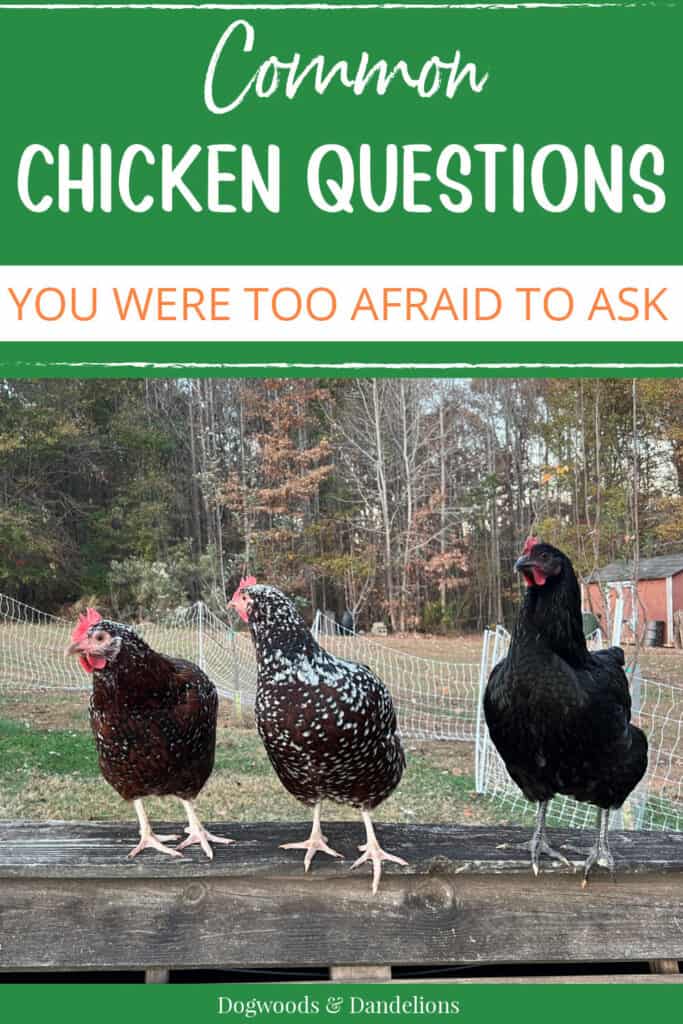Common Chicken Questions (You Were Too Afraid to Ask!)
Inside: Find the answers to many common chicken questions beginning chicken keepers often have, but are too afraid to ask.
When you start raising a flock of backyard chickens, you often have many questions. And while you can find answers to many of these questions via Google (or my blog) there are some questions you just might not think to ask. Allow me to answer these common chicken questions you didn’t want to ask.
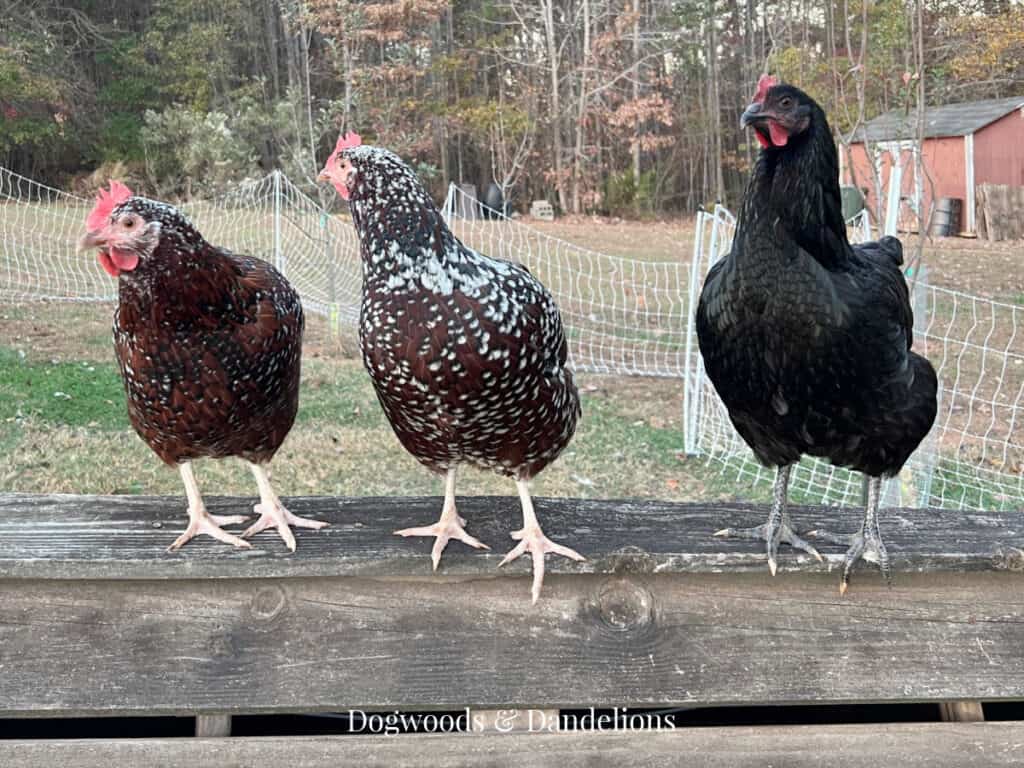
Affiliate Disclosure: Please note that some of the links in this article may be affiliate links and I may receive a small commission if you purchase something through a link. It will not change your cost. As an Amazon Associate, I earn from qualifying purchases. For more information, see my disclosures page.)
What Are Baby Chickens Called?
Baby chickens go by many names. The most common name is chicks. Many old-timers refer to baby chicks as dibbies or biddies. A young female chick is called a pullet and a young male chick is called a cockerel.
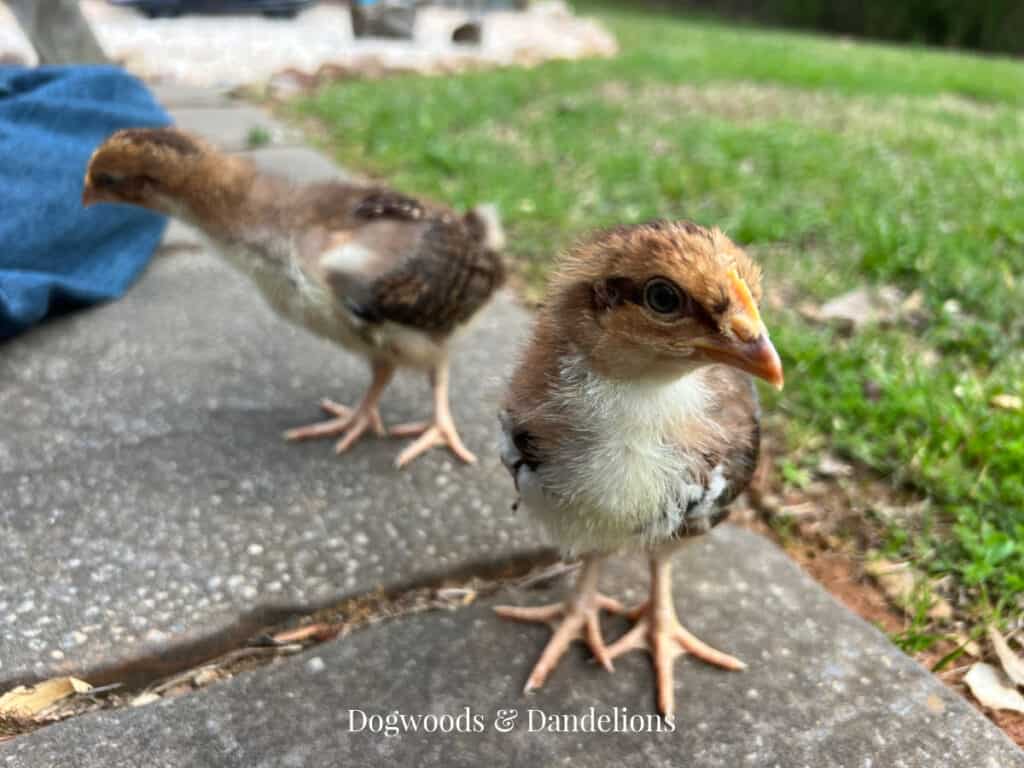
If you are looking to understand more chicken terms, this post explains all the chicken words you may be unfamiliar with.
How High Can Chickens Jump?
Most chickens can jump, but not too high. And there are a lot of factors that determine how high a chicken can jump. Most healthy chickens can jump 2 – 3 feet without much trouble.
However, some talented chickens can jump up to 6 feet high. Our rooster, Red, is easily able to jump about 4 feet (without flying) to stand on our dog house and crow in the morning.
Why Are My Chickens Losing Feathers?
There are many reasons your chickens may lose feathers. Your flock could be going through their yearly molt. But only one or two birds are losing feathers, it could be a sign of illness, pecking by a mean hen, or over-mating by a rooster.
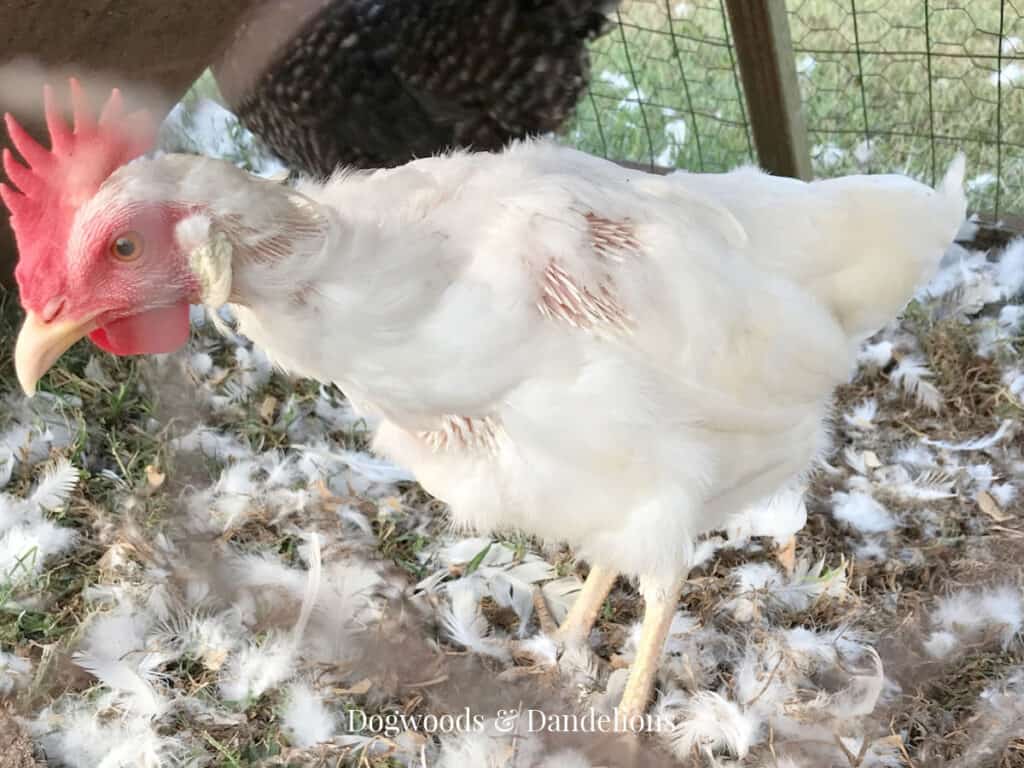
I’ll be sharing a post soon with more information on this topic.
Are Chickens Vegetarian?
Chickens are not naturally vegetarian. They are omnivores, eating both plants and animals. If you let chickens free range, they will eat bugs, worms, lizards, frogs, and the occasional snake or mouse.
If you feed your chickens only laying pellets or crumbles, then your flock may be mostly vegetarian as most chicken feed is made with corn and other meat-free protein. But unless you keep your chickens locked up tight with no way for anything to get in, they won’t likely be vegetarian.
(And definitely don’t keep your coop airtight to prevent your birds from eating bugs and small critters. Lack of ventilation in a coop can be deadly to your flock.)
Read more on Why Chickens Aren’t Vegetarians
What Foods Are Poisonous to Chickens?
There are quite a few foods that can be poisonous to your flock. However, most chickens will avoid these foods if given a proper diet. For more information on the most toxic foods to chickens, this post can help.
How Do Chickens Pee?
Chickens don’t have a bladder so they really don’t “pee.” All their waste (urine and feces) is combined into one waste product called excreta and is then eliminated via the cloaca.
However, if you look closely at the chicken excreta (poop) you will see that there is often a white cap on top of the brown matter. This is the urate which is what is expelled from a chicken’s urinary system. It is combined in the intestines and expelled along with the poop.
Does it Hurt a Chicken to Lay Eggs?
The quick answer is no, it normally doesn’t hurt a chicken to lay an egg. However, there are instances when laying an egg can cause a chicken pain. This entire post goes into much more detail about when it might hurt a chicken to lay an egg.
Why Do Chickens Peck Holes in Their Eggs?
There are many reasons chickens may peck holes in their eggs. Usually, they do it because they chickens are naturally curious creatures. If you watch them, you’ll notice they peck at almost everything, including each other.
But many times what happens is that a chicken will be nosy and peck around in the nest box and accidentally peck a hole in an egg. Once they break the egg, they get a taste of the inside and finish it off.
If this happens frequently, you can end up with an egg-eater (or a flock of egg-eaters) on your hands. It is best to try to stop this behavior immediately. I share the details of how to stop an egg-eating chicken in this post.
Does a Chicken Lay an Egg Every Day?
Most hens do NOT lay an egg every day. During peak laying season, the best egg-laying breeds will lay 4 to 5 eggs a week. However, during the winter, your chickens may not lay any eggs at all.
If you are looking to get the most eggs from your backyard flock, read more about the best egg-laying chicken breeds.
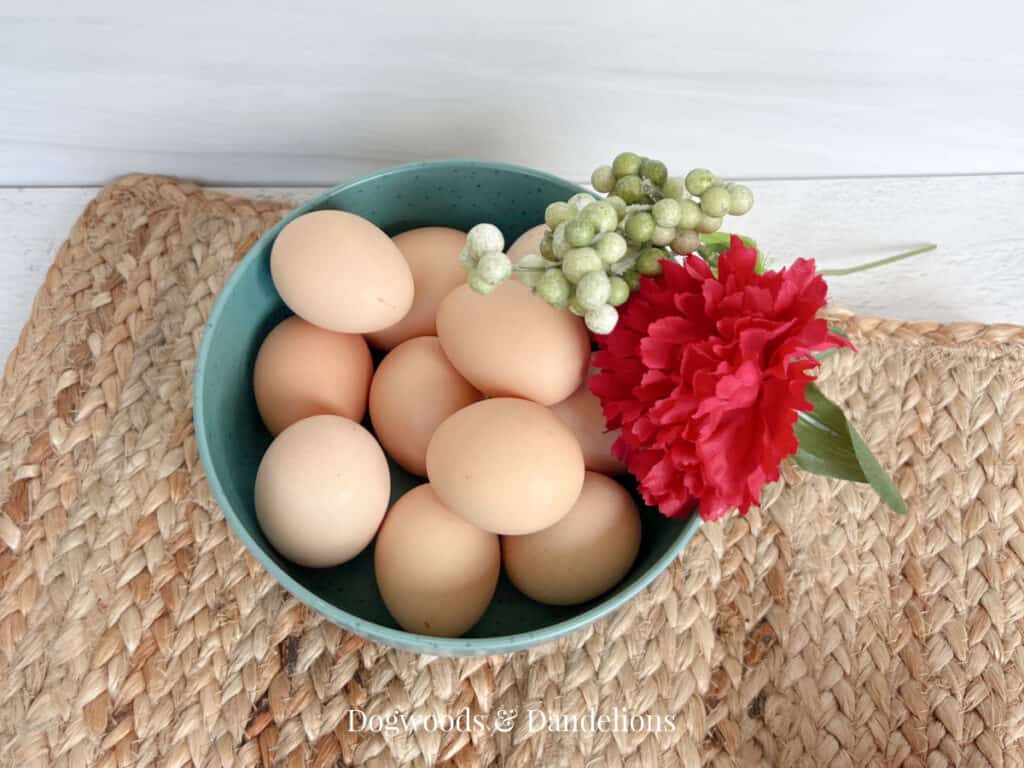
Do Chickens Lay Eggs in the Winter?
Do chickens lay eggs in the winter? Maybe. A chicken needs about 14 hours of sunlight to make an egg. So during the winter, your flock will usually lay fewer eggs.
If you got your chickens in the spring as baby chicks, they may continue to lay a decent number of eggs throughout their first winter. However, in the second year, they will molt in the fall and molting takes lots of energy.
So instead of using that energy to create eggs, most will put it towards regrowing feathers. You can add supplemental light to your coop if you would like to encourage your hens to lay more eggs during the winter. There are some pros and cons to adding additional light so I encourage you to read the post to learn more.
What Are the Chicken Breeds That Lay the Most Eggs?
There are quite a few good egg-laying chicken breeds. Australorps, Buff Orpingtons, and Golden Comets tend to be some of the best egg layers. But adding some Leghorns and Easter Eggers to your flock will add some color to your egg basket.
If you want all the details on the best egg-laying chicken breeds, this post explains why these breeds are best and shares information on other breeds that lay lots of eggs.
Why Are My Chickens Not Laying Eggs?
There are many reasons your hens may not be laying eggs. If they are going through their molt, they stop laying to devote their energy to regrowing feathers.
But other reasons include fewer daylight hours, stress, or illness. This post dives deeper into the topic of chickens not laying eggs to help you discover if you have a problem or if it is just the natural cycle of egg-laying.
Do You Need a Rooster to Have Eggs?
The simple answer is, NO, you don’t. If you want a few backyard chickens, you do not need a rooster to have fresh eggs.
Your chickens will lay eggs just fine without a rooster, and in fact, they may even be happier with no rooster chasing them around. And having a rooster won’t increase egg production either.
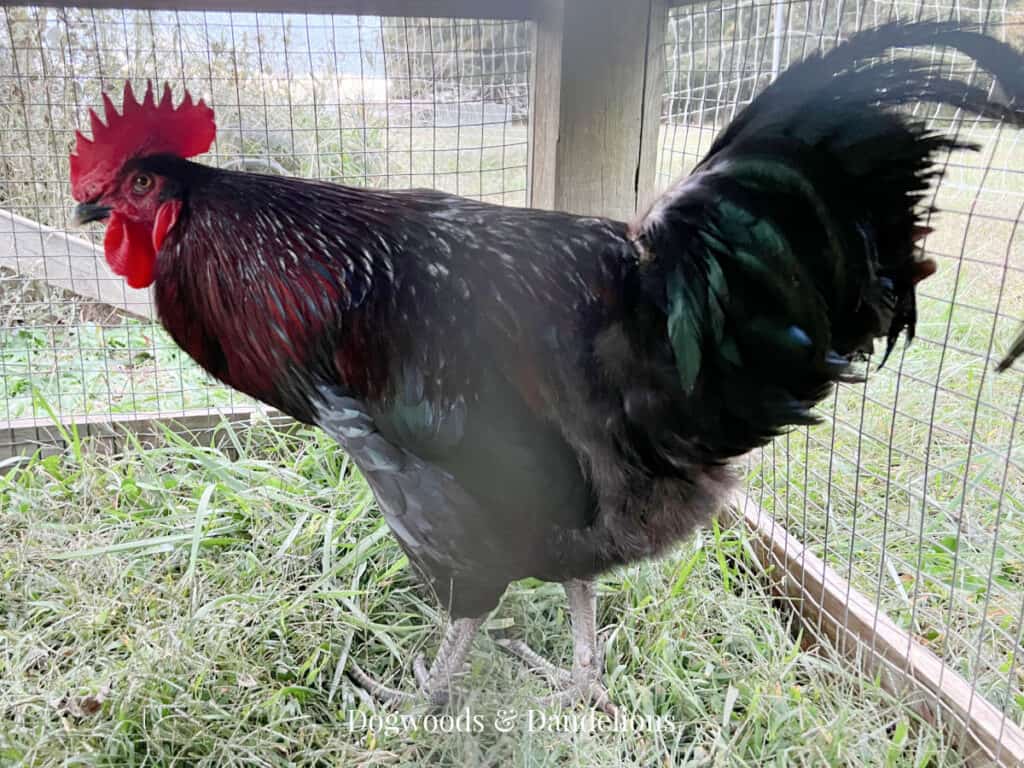
Learn more about the pros and cons of keeping a rooster with your flock in this post.
Does a Rooster Only Crow at Dawn?
Roosters don’t only crow at dawn. They can and will crow at all hours of the day and night. Our rooster can hear some roosters crowing down the road and he will start crowing along with them.
We’ve heard our rooster crow occasionally around 9 or 10 o’clock in the evening when a predator was likely lurking about. But I’ve heard him crow at 3:45 in the morning too for no apparent reason. And he will also crow at random times during the day.
Do You Have Other Chicken Keeping Questions?
What other chicken-keeping questions do you have? I would love to answer them in the post for you. Drop them in the comments and I’ll update the article.

Meet Julie
I’m a farm girl born and bred in North Carolina. I’ve been growing a vegetable garden for over 20 years (and helping my Mom grow hers even longer). I’ve been raising chickens in my bathtub and backyard for 12+ years. I believe that homegrown food can be made simple. Let’s get started.
